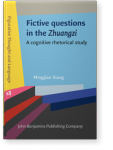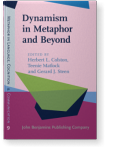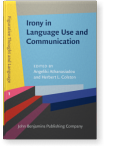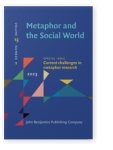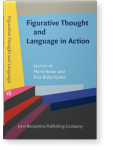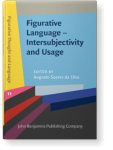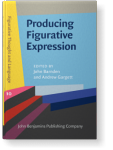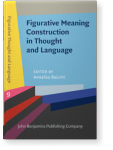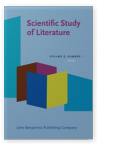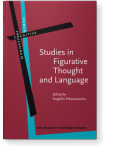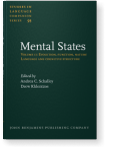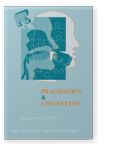Herbert L. Colston
List of John Benjamins publications for which Herbert L. Colston plays a role.
Book series
Titles
Dynamism in Metaphor and Beyond
Edited by Herbert L. Colston, Teenie Matlock and Gerard J. Steen
[Metaphor in Language, Cognition, and Communication, 9] 2022. vii, 359 pp.
Subjects Cognition and language | Communication Studies | Theoretical linguistics
Irony in Language Use and Communication
Edited by Angeliki Athanasiadou and Herbert L. Colston
[Figurative Thought and Language, 1] 2017. x, 282 pp.
Subjects Cognition and language | Cognitive linguistics | Communication Studies | Humor studies | Philosophy | Pragmatics | Psycholinguistics
2024 A look at, inside, and outside metaphors: The multitudinal interactions of metaphorical meaning Review of Cognitive Linguistics: Online-First Articles | Article
How metaphors are comprehended and their pragmatic effects have long been of interest (Colston, 2019; Gibbs, 2017; Gibbs & Colston, 2012). Attending to the varied constructions where metaphors appear has also advanced our understanding (Athanasiadou, 2017). How metaphors in extra-linguistic… read more
2023 Measurement matters: An afterword on current challenges in metaphor research Current challenges in metaphor research, Julich-Warpakowski, Nina and Paula Pérez-Sobrino (eds.), pp. 104–119 | Article
Researchers studying metaphor, as a human artifact, as a thing we use in communicating and expression, as an ability we acquire, as a seemingly fundamental process in human embodied cognition, and in other guises, face many methodological hurdles. This article considers several categories of… read more
2022 Figurativity: Cognitive, because it’s social Dynamism in Metaphor and Beyond, Colston, Herbert L., Teenie Matlock and Gerard J. Steen (eds.), pp. 243–264 | Chapter
We’ve long recognized that figurative language is social in multiple ways. But new developments in both socio-cognitive neuroscience and linguistic pragmatics suggests that the extent to which all language, figurative and everything else, might be considered social has been underestimated. This… read more
2022 Embodied simulations and verbal irony comprehension Figurative Thought and Language in Action, Brdar, Mario and Rita Brdar-Szabó (eds.), pp. 167–184 | Chapter
Recent research has addressed the role that embodied simulations (ESs) play in language processing (Bergen, 2012). One forefront in this work is investigating ESs’ role in metaphorical language comprehension, as when one hears or reads: “The Donald Trump supporter went bananas after the 2016 U.S. read more
2022 Introduction Dynamism in Metaphor and Beyond, Colston, Herbert L., Teenie Matlock and Gerard J. Steen (eds.), pp. 11–28 | Introduction
2021 Evaluating metaphor accounts via their pragmatic effects Figurative Language – Intersubjectivity and Usage, Soares da Silva, Augusto (ed.), pp. 75–108 | Chapter
A prominent pragmatic effect of metaphor is meaning enhancement (Colston, 2015). Relative to comparable non-metaphorical language, metaphors can provide stronger, richer, or more poignant delivery of a proposition, idea, attitude, emotion, schema, or other meaningful construct. Metaphor… read more
2020 On why people don’t say what they mean: Production of figurative formulaic language Producing Figurative Expression: Theoretical, experimental and practical perspectives, Barnden, John and Andrew Gargett (eds.), pp. 129–174 | Chapter
The study addresses two problems with recent psycholinguistic research on why people don’t say what they mean, (1) possible underrepresentation in research studies of types of figurative language found in everyday talk, and (2) potential ecological validity problems due to using standard… read more
2020 Sources of pragmatic effects in irony and hyperbole Figurative Meaning Construction in Thought and Language, Baicchi, Annalisa (ed.), pp. 187–208 | Chapter
How persuasion is accomplished by speakers who use hyperbole and irony, in response to accusations of wrong-doing, was investigated in three experiments. Results confirmed a predicted dissociation – when accused speakers exaggerate denials (e.g., “I have never, ever stolen anything from this… read more
2019 What psycholinguistic studies ignore about literary experience Scientific Study of Literature 9:1, pp. 72–103 | Article
Multiple decades of psycholinguistic research exploring people’s reading of different types of language has delivered much improved understanding of textual comprehension experience. Psycholinguistic studies have typically focused on a few cognitive and linguistic processes presumed to be… read more
2017 Chapter 1. Irony performance and perception: What underlies verbal, situational and other ironies? Irony in Language Use and Communication, Athanasiadou, Angeliki and Herbert L. Colston (eds.), pp. 19–42 | Chapter
Differing notions of things labeled as “irony”, and issues concerning their relative unity versus disunity are discussed. Accounts of verbal and situational irony in particular are considered as sharing the oft-mentioned but rarely agreed-upon form of contradiction that seems to potentially… read more
2017 Chapter 11. Pragmatic effects in blended figures: The case of metaphtonymy Studies in Figurative Thought and Language, Athanasiadou, Angeliki (ed.), pp. 273–294 | Chapter
Issues concerning pragmatic effects resulting from blends of figurative language forms are considered. Different resulting patterns in such blends are approached first through deconstruction of pragmatic effects in individual figures such as metaphor, synecdoche, broader metonymy,… read more
2017 Introduction: The irony of irony Irony in Language Use and Communication, Athanasiadou, Angeliki and Herbert L. Colston (eds.), pp. 1–16 | Introduction
2007 9. What figurative language development reveals about the mind Mental States: Volume 2: Language and cognitive structure, Schalley, Andrea C. and Drew Khlentzos (eds.), pp. 191–212 | Article
2000 On necessary conditions for verbal irony comprehension Pragmatics & Cognition 8:2, pp. 277–324 | Article
The conditions for verbal irony comprehension implicitly or directly claimed as necessary by all of the recent philosophic, linguistic and psycholinguistic theories of verbal irony (Clark and Gerrig 1984; Kreuz and Glucksberg 1989; Kumon-Nakamura, Glucksberg and Brown 1995; Sperber and Wilson 1981,… read more
